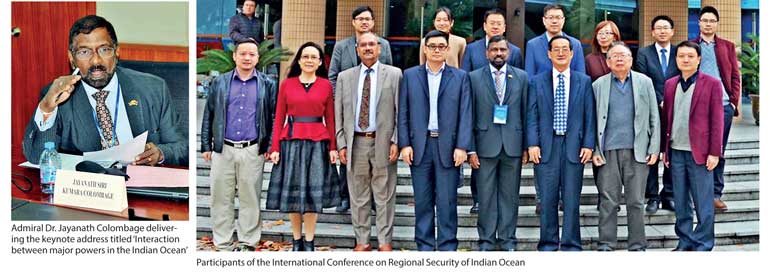Saturday Feb 21, 2026
Saturday Feb 21, 2026
Friday, 12 January 2018 00:00 - - {{hitsCtrl.values.hits}}
 The Center for South Asian Studies at Fudan University, under the leadership of Prof. Zhang Jiadong, conducted the second annual International Conference on Regional Security of Indian Ocean recently in Shanghai, China.
The Center for South Asian Studies at Fudan University, under the leadership of Prof. Zhang Jiadong, conducted the second annual International Conference on Regional Security of Indian Ocean recently in Shanghai, China.
Its three sessions focused on ‘Interaction between major powers in the Indian Ocean’, ‘Perspectives on the regional security situation in the Indian Ocean from Middle Powers and Small Powers’ and ‘China`s role in the Indian Ocean in the context of One Belt and One Road initiative’.
The conference was conducted with the participation of scholars and subject matter experts from China, Pakistan and Sri Lanka. On an invitation of the Fudan University, the Pathfinder Foundation non-profit, non-partisan research and advocacy think-tank, which has played a direct and catalytic role in promoting economic policy reforms, participated in this academic conference represented by Center for Indo-Lanka Initiatives Director Admiral Dr. Jayanath Colombage. Admiral Dr. Colombage presented the keynote address titled ‘Interaction between major powers in the Indian Ocean’. He called the Indian Ocean an emerging centre of gravity of the world maritime trade and also an area where power and influence were being contested for and stressed upon the fact that the rise of China as a global economic power and the People Liberation Army Navy’s (PLAN) enhanced presence in the Indian Ocean has drawn the attention of major powers such as the US, Japan and Australia in addition to India.
This strategic interest has led to a strategic convergence of the US, India and Japan on one side to counter the growing influence of China. This contest has given rise to an undeclared Maritime Cold War in the Indian Ocean.
The Admiral further explained that the Bay of Bengal region was reasonably calm and devoid of state on state tension in comparison to the western Indian Ocean, which is witnessing failing states, a lack of law and order, nuclear rivalry and mistrust despite the fact that most of the developed and developing countries are dependent on energy produced and transported across it. Therefore, the strategic importance of the western Indian Ocean is equally high.
The Bay of Bengal community through BIMSTEC, with the support of Japan and the US, is moving ahead after nearly 20 years in existence. BIMSTEC is now even discussing security as part of its agenda. The admiral went on to say that there were many initiatives taking place in the Indian Ocean to enhance maritime connectivity and all countries should benefit from these.
These initiatives should not compete against one another and force the smaller, less-developed countries to choose between them. That will lead to a predicament for smaller states and hamper their economic growth.
Threats posed by non-state actors also create maritime security concerns in this ocean and will possibly impact the freedom of maritime commerce. The Indian Ocean is a global common and the centre of gravity of the global economy and hence freedom and rules-based maritime order are of the utmost importance.
Peaceful resolution of outstanding disputes is a must for the stability of this ocean and a new Indian Ocean order where all states have equal status and all are committed to maintain order at sea is necessary for the development of Indian Ocean countries.